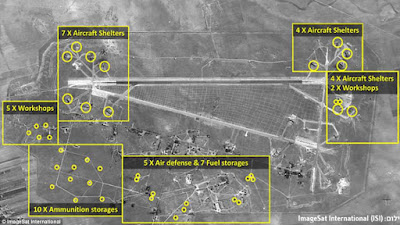 |
| Sha'yrat air base, Syria - damage from April 6 U.S. missile strike |
Last night, the White House released a statement indicating that the Syrians may be making preparations for another chemical weapons attack, specifically an air attack from Sha’yrat air base, the same base from which the April 4 chemical weapons attack in Khan Shaykhun (Idlib province) was launched.
Since the United States has demonstrated its willingness to strike Syrian military targets in retaliation for chemical weapons usage, why would Syrian President Bashar al-Asad risk another American military attack?
Looking at Syria’s military situation, it does not make sense to use chemical weapons.
First, in the fight against the Islamic State in Iraq and Syria (ISIS), the Syrian Army is doing well, consistently taking territory from ISIS south of al-Raqqah and south of Palmyra. These two axes are part of a thrust into ISIS-held territory to reach the besieged city of Dayr al-Zawr on the Euphrates River.
The city and adjacent air base have been surrounded and under siege by ISIS for over two years. This effort is complemented by an operation mounted mostly by Iranian-supported militias moving northeast along the Iraqi border towards the Euphrates and Dayr al-Zawr.
Of course, the term “Syrian Army” includes heavy Russian air support and advice, Iranian military and Islamic Revolutionary Guard Corps units, Lebanese Hizballah, and Iraqi Shi'a militias. Without this foreign support, the Syrian military would like not constitute a viable military force.
That leaves the fighting against the various opposition groups – the Free Syrian Army (FSA) and the al-Qa’idah-affiliated Islamist organizations. These include Hayat Tahrir al-Sham (HTS) and Ahrar al-Sham, both designated as terrorist groups. Mainly present in Idlib, the Syrians are not having great success against these groups, despite constant air, missile and rocket strikes on the groups.
In the southern province of al-Qunaytirah, the Syrian military is also having a difficult time in fighting another FSA group as well as an ISIS-affiliated group.
Assuming Bashar al-Asad orders a chemical weapons strike, what would be the target?
The Syrians are not going to use chemical weapons in al-Qunaytirah along the Israeli-occupied Golan Heights – the risk of Israeli reaction is too great.
There is no need to use chemical weapons against ISIS since those operations are going well.
Then there is Idlib province, home to the Islamists, FSA and many opposition refugees who have been relocated to the province vie ceasefire arrangements in cities the Syrian regime has besieged in the past.
In my opinion, Syria’s chemical weapons are militarily insignificant. A few weapons dropped on cities in Idlib will not affect the situation on the ground. It will cause mass murder, cause panic among the local population, draw international condemnation – and almost certainly an American military response. Why do it? Frustration and spite? Possibly.
Bashar al-Asad has been emboldened by seemingly increasing political and military support from his two key backers – Russia and Iran – but it is hard to believe he would resort to using chemical weapons again.
I would hope that the Russians are giving him counsel on what a mistake this would be.
Tweet


.jpg)
